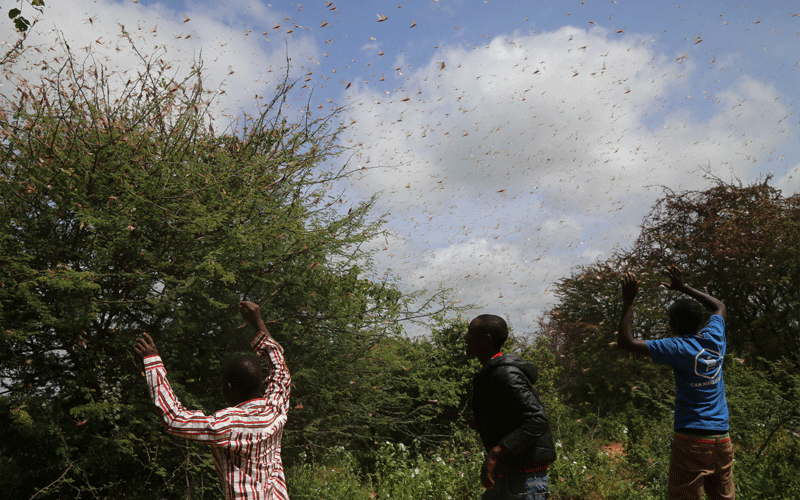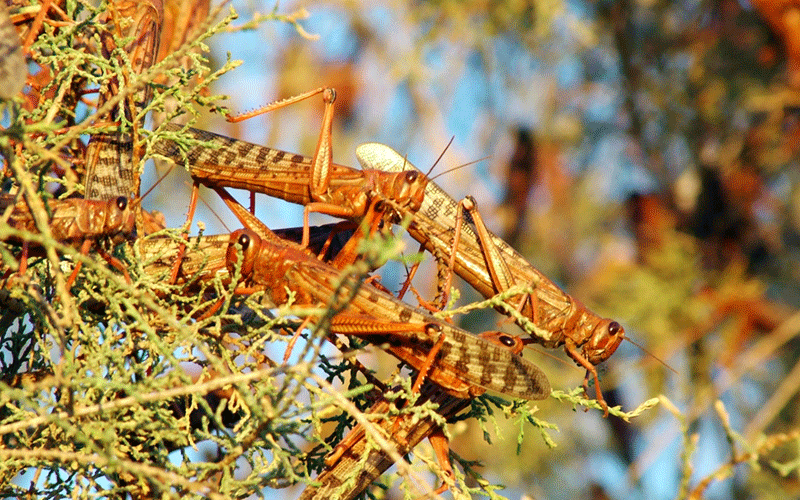State approves quick import of pesticides to counter desert locusts

The government has approved quick importation of pesticides to help stem the upsurge of desert locusts that are terrorising farmers in 13 counties.
A Cabinet meeting chaired by President Uhuru Kenyatta yesterday allowed the Agriculture ministry to engage in government-to-government procurement to ensure quicker delivery of the pesticides.
“In recognition of the cross-border nature of the locust invasion, the Cabinet directed the Ministry of Foreign Affairs to engage and work with regional and multilateral agencies including Food and Agriculture Organisation (FAO) and Igad to come up with modalities on how to deal with the threat in the region,” said a statement from the Presidential Strategic Communications Unit.
The decision came as FAO warned of an “extremely alarming and unprecedented threat to food security and livelihoods in the Horn of Africa” unless urgent and concerted action is taken to arrest the desert locusts invasion.
Bear fruit
In a statement, the UN food agency warned that numbers of desert locusts are increasing and could multiply 500 times by June and thus worsen the situation.
Keith Cressman, senior locust forecasting officer at FAO called for concerted efforts to stop the deadly insects from increasing.
Fao’s latest update issued on Wednesday indicated the current locusts upsurge situation would be further worsened by new breeding that will produce more locust infestation in Ethiopia, Kenya, and Somalia.

Earlier, Government Spokesman Col (rtd) Cyrus Oguna had assured adequate measures have been put in place to contain the locust invasion in some parts of the country. He said the efforts are beginning to bear fruit as they have prevented locusts from invading new areas.
“As government we will continue with measures to clear the pests and limit them from spreading to new areas,” said Oguna.
He said the deadly insects have ravaged 12 counties with farmers appealing for urgent government intervention to save them from “utter devastation”.
The locusts, which entered Kenya through Somalia and invaded the northern counties of Mandera, Wajir, Marsabit, Garissa and Isiolo have spread to Meru, Samburu, Laikipia, Machakos, Baringo, Embu and Kitui.
Already, counties neighbouring the affected areas are apprehensive over what they say is slow action by the government to stop the locusts.
But Oguna said anti-locusts fight is being carried out by a multi-agency team to avert further threat to food security and environmental degradation.
He said the government has deployed five spray aircraft and four surveillance aircraft for aerial control of the locust swarms in the counties affected.
Oguna said the Kenya Army had given out four Land Rover vehicles to undertake ground spraying in Isiolo and neighbouring counties, adding that 18,000 litres of pesticides have been dispatched to Wajir, Marsabit, Kitui, Isiolo, Mandera, Samburu and Garissa counties and while 2,000 litres have been sent to Baringo and Nakuru.
Additionally, 145 officers have been trained and deployed to undertake surveillance and monitor the pests and support the control team in Mandera, Wajir, Isiolo, Marsabit, Samburu, Kitui and Meru counties.
The official refuted claims the pesticides being used to eliminate the locusts are ineffective and pose a risk to human life and environment.
Meanwhile, Mbeere North MP Col (rtd) Geoffrey King’ang’i, who accompanied Oguna during a meeting with residents at Machang’a in Mbeere South, Embu county, has lauded the government efforts in fighting the locusts invasion.
However, he urged the government to compensate farmers affected by the pests.
But Kiharu MP Ndindi Nyoro has accused the National government of laxity in fighting the locust menace.
Speaking in Kambirwa where a swarm of the desert locusts was reported, he said if caution is not taken, the entire country would be left begging for food.
Cause destruction
“Most of the farmers got a bumper harvest but they have not been able to remove their produce from the farm because of the rains and the pests are likely to eat away everything,” said the MP.
Murang’a Agriculture Executive Albert Mwaniki said they are liaising with the National government to see what measures will be put in place.
Elsewhere, hundreds of farmers in parts of Lower Eastern region whose farms have been affected by the locust invasion now want compensation from the National government.
Farmers reached by People Daily in Mwingi North sub-county in Kitui county and areas of Masinga in Machakos county said the locusts have caused massive destruction in the area.
“There is panic among the residents of Kivaa in Masinga after locusts were spotted in the area on Monday having moved from Mwingi and Lower Mbeere in Embu county,” said Masinga deputy county commissioner John Ayienda.
In Kitui, farmers in Tseikuru, Ngomeni, Nguni and Kyuso wards of Mwingi North sub-county are counting losses.
They said despite the aerial spraying that has been conducted thrice, the swarms of desert locusts are still destroying crops and animal fodder.- Reporting by Bernard Gitau, Brian Musyoka, Charles Muasya and Rebecca Wangari














